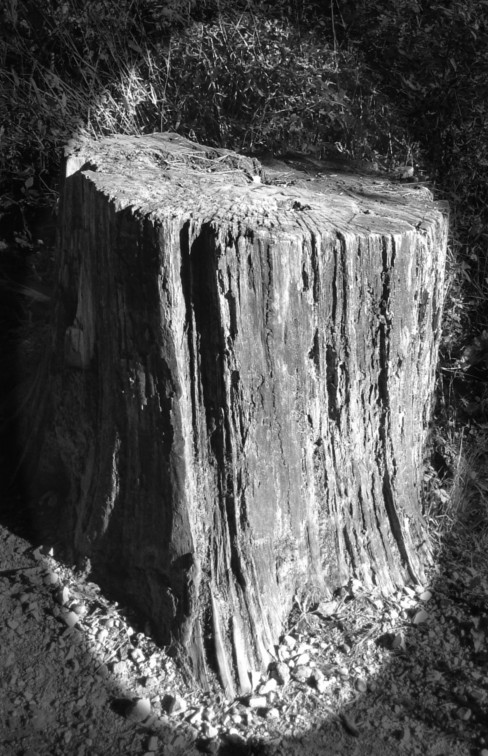EULOGY OF PAUL BUNYAN, LUMBERJACK

EULOGY OF PAUL BUNYAN, LUMBERJACK:
“A tree has fallen in the middle of the woods. And to that age-old question, yes—for Paul Bunyan has hauled away the great divide.
Of course, you all know Paul.
The world holds its breath for a moment half expecting another of this old-time lumberjack's bold, clever solutions with which he may find leave of his current predicament.
But his axe has been silenced.
The loggers are gathering from the four corners of the woods right now to tell the stories of the good ole days: the winter of the blue snow, the round river drive, the year the rain came up from China.
Yet where once these stories rang aloud with a sense of wonder, now, another air takes hold.
A meaning greater than mere praise, something solemn, almost pure, a feeling what might be called “veneration.”
For Paul Bunyan, he was a man among men, his life a lesson that hubris need not be incompatible with humility.
To those who knew him he was blunt, and stubborn, and loud, and half a million and a half other things. And to those who didn't, he was sure to let them know.
Never was there trouble that came his way he didn't meet as a challenge, a calamity was his providence, and he bore it with neither gripe nor complaint. For Paul knew when to be tough, h—ll, he knew when to be downright rigid, but despite all his great strength, raw power and all what he could do, he never forgot what it meant to be human.
He was never cold or callous to his crew and wasn't one to make a fuss. He was the boss, and never did you forget it, but he was one of the fellas and wouldn't have it any other way.
He was tough but fair through and through. And in his heart of hearts that fairness is where a lion dwelt with a lamb.
HE SAY HE WAS NOT A PHILOSOPHER, but Paul would say if you hate someone for a second you waste a second. If you hate someone for a lifetime— your entire life.
HE SAY HE WAS NOT A PEACEMAKER, but Paul would say that making peace in this world is more important than anyone’s pride or opinions, because pride or opinions don't stop bullets.
HE SAY HE WAS NOT A COUNSELOR, but Paul would say that the best way to learn is to just jump and see if you can swim ... for most things—except swimming, of course.
HE SAY HE WAS NOT A PHILANTHROPIST, but Paul would give you the shirt off his back and then ask if you needed a beard and a pipe to match.
HE SAY HE WAS NOT ONE FOR SILENCE, but Paul would speak a bad word about no one and knew better than to follow those who did. Paul was content to know that fools are fools for being fools, and he left it at that. He'd never single anyone out but went about what he needed to get done and—he always got everything done.
Where there are so many today who troubled themselves with the business of others and do a great deal of harm, Paul, just like the apostle, minded his own business, made it his aim to live a quiet life and worked with his hands to earn an honest living. He got far because he wasted no energy on things that did not matter.
So many are the people today who ask, ‘How do I be great? What do I need to do? What do I need to accomplish?’
But Paul, he understood that greatness in deeds does not come before greatness in character but greatness in character comes before greatness in deeds.
‘Good people are good to know,’ Paul, the non-philosopher non-poet, used to say, ‘Kind acts are the only kind worth rememberin', an' a bad word is best forgotten, for sure, as are those who speak them.
Nobody knows his or her moment before it comes, eh? To be great requires being ready. It is only the right person with the right character who makes the right decisions at the right moment. It is the ‘who’ not the ‘what’ upon which greatness rests.
But character ain't gonna come from nowhere, y'know? It must be built. Best way to build your character is by buildin' up every soul you meet. But tearin' folks down, talkin' bad 'bout 'em, sorry, but that just does three things: makes most folk tired of you, the rest scared of you and those who care worried for you. It is the envy of none. Only for those who wanna feel like a hero without the trouble of ever being one.
It destroys our character by first destroyin' our heart. An' if takes any one thing to be great, to be good, to be remembered— IT'S a lot of heart.
Heart is what wins in the end an' what finally wins people over."
Now, it always kind of bothered me, all those stories about Paul, they didn't make him seem real, but you know somethin'? He was the realest person you never met.
With that may we remember this non-philosopher, non-peacemaker, non-counselor, non-philanthropist, non-silencer, non-poet—with a lot of heart.
Good bye.
Oh, uh, thanks Paul,
And that's all.”
* * *
IN MEMORIAM
MCBRIDE: ‘Say what?’
LOMAX: ‘Did you ever know anybody like Paul Bunyan?’
MCBRIDE: ‘Oh no, not just like him. Not, not that, that's just a story made up you know 'bout Paul Bunyan.’
LOMAX: ‘Uh huh.’
MCBRIDE: ‘That's just a story, eb, uh, [stammers] everything is made up like that. Knowed a fella they use to call, er, uh, fellow by the name of old Jim Bahee. He used to lumber, himself, he was a lumberman, a little bit that was his jobber, he take jobs. He was a great fella to spur out and do such work, somethin' like Paul Bunyan takin' on this 'n that, 'n' tell ya 'bout this thing and that thing, and how to do all these things, and everything, and said he was the first man, who, that logged on the Tootsie River, deliver on two bales of cotton, and he supposed to, go—mn, and since he couldn't get his shortage, y'know, certain, and all such things as that.
And, oh, I don't know, tell ya 'bout how what he had done and—worked on Round River, and all these things like that, and tell ya big shot t' [to] things, and how what he could do, and how he carried 500 pounds of shot, uh, right over a new pavement, theys puttin' it in there, took 500 pounds in each hand, of buckshot, and took it in a sack, and he walk across that new pavement, and he sunk clear into his knees, and all such things as that, y'know?
Leading on to that, [laughter] y'know? That's the story 'bout what they get up 'bout Paul Bunyan or goodin' thang here.’”
— Bill McBride in interview with Alan Lomax, August 22, 1938, Mount Pleasant, Michigan
* * *
— James MacGillivray, “Round River,” The Oscoda Press, August 10, 1906
* * *
Paul he had a deer dog part hound and part Injun dog that had been nursed on bear milk and was the biggest dog in Michigan. Paul he took his old gun one day and his dog Elmer and started out to get him some meat. Elmer he took a track and away they went. Paul he seed the deer was going straight away so he took after them.
Paul knew if he could see the deer it was hissen because his old gun Betsy she was loaded with two dishpans full of powder and a keg of railroad spikes. They run to Detroit and around Flint and up north again and Paul he seen by the tracks it was a big buck. A little boy had fell into one track in the mud and it was too deep for him to climb out.
Ten days after he started out, the buck took to water at Muskegon and swum to the Wisconsin side. Paul hitched a scow to Elmer's tail and Elmer he towed Paul across Lake Michigan.
Finally the buck took south, and Paul seen him near Chicago, about four miles off and drowned him.
‘What am I going to do with all this meat?’ says Paul, and just then Mr. Armour came along and gave Paul $1,000 for the buck and offered him a $1,000,000 for Elmer, and Mr. Armour right there set up his big meat business.
GEORGE J. SPARKS
Gen. Del., Bellingham, Wash.”
— George J. Sparks, The Seattle Star, November 19, 1920
* * *
— K. Bernice Stewart and Homer A. Watt, “Legends of Paul Bunyan, Lumberjack.”
* * *
“Having worked with Paul Bunyan on some of his biggest jobs, it gets under my skin to read some of the atrocious suggestions that have been written about him of late. Anyone can see with half an eye that they are absolutely impossible. Back in 1820 I was with him when he wrecked the Bridge of Gods, because it had been condemned as a menace to river traffic. I came west with him the following year, when he signed a contract to clear the prairie of timber and level it off in ninety days, which he did ten days before the specified time. I also accompanied him to the coast and was with him when he dug the Portland Canal.
The speediest job I ever saw him do, though, was in a contest with an Irish woods boss from one of the southern pine camps, This Irishman had worked up a local reputation and thought he was riding astride the world until he sent a challenge to Paul stating that he was the better faller of the two and demanding a match. They decided to meet in the redwoods. Thousands flocked there to see these two supermen.
“The referee picked out two big redwoods, each 34 feet in diameter and 240 feet high, and the men took their places. The starter’s whistle popped and before the echo had died away Paul had burned out three saws and flattened the edges of five axes putting in his undercut. Grabbing a new 40-foot saw he started to put her down. So fast did he saw that it took 17 men to keep him supplied with saws, and there was a stream of melted steel pouring out of the saw out. As fast as one melted Paul put in a new one. He perspired so much that the spectators had to take to the trees to keep dry, and finally when the tree cracked the sweat was so deep that Paul was treading water and sawing.
“Well, when that tree leaned to an angle of 65 degrees Paul grabbed a bucking saw and ran up it 20 feet and bucked off a log, then another 20 feet, and by the time the tree was down it was all bucked up into 20 foot logs, and Paul had done a swan dive from the last one, 80 feet in the air. They looked around and were surprised to see the Irishmen's tree still standing with a cut about 20 feet deep in it., and him missing. However, he had written on a paper the following: ‘As a logger I'm a good bull-cook.”
— An Old Logger on the Job, “This is for the Benefit of all Logging Liars”, The Herald, Alice Arm and Anyox, British Columbia, Saturday, May 20, 1922
☜ BACK
